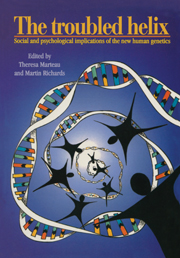Preface
Published online by Cambridge University Press: 01 June 2011
Summary
The development of new techniques for characterising the genetic material we each carry is proceeding at an accelerating pace and is beginning to affect the lives of us all. Those most conscious of this are the members of families who carry genetic disorders. For many genetic disorders, testing techniques are becoming available that indicate which individual carries gene mutations and so are at risk of developing the disorder. For those few conditions where effective interventions or treatments are available, these genetic tests may help to indicate those individuals who may benefit from these as well as the family members for whom they are unnecessary. For most disorders, however, there are no treatments but tests can be used to avoid the births of affected children through the use of prenatal diagnosis and selective abortion. Currently the main application of the new genetics is testing for the presence or absence of gene mutations, but one of the main driving forces behind the research is to develop therapies; as yet, however, very few are available. The first tentative steps are now under way to insert functional gene sequences to replace those that, through mutation, have become inoperative and so cause disease. While this research continues, for the foreseeable future, the main clinical use of the new genetics is in the prediction of disease.
More widely, the same technologies are deployed in genetic fingerprinting to trace criminals from blood and semen samples, to settle cases of disputed paternity and for a host of other purposes where the genetic identity of any animal or plant is an issue.
- Type
- Chapter
- Information
- The Troubled HelixSocial and Psychological Implications of the New Human Genetics, pp. xiii - xviPublisher: Cambridge University PressPrint publication year: 1996



